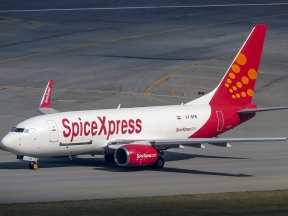Cargolux has brought Sustainable Aviation Fuel (SAF) to Luxembourg Airport (lux-Airport) for the first time as the cargo airline works towards decarbonising its operations. In partnership with World Fuel Services, Neste, and Luxembourg Airport, Cargolux worked to achieve delivery of the bio-based fuel to Luxembourg Airport’s fuel farm via NATO’s Central European Pipeline System (CEPS). The SAF is from sustainably sourced, 100% renewable waste and residue raw materials, in compliance with the EU Renewable Energy Directive (RED II) Directive.Using this SAF, Cargolux will operate a carbon neutral flight from Luxembourg to Zhengzhou, its biggest hub in mainland China. The 747-8F will land in Zhengzhou on time for a ceremony marking the 10th year since Cargolux first started operating services to Zhengzhou in 2014.
Read More »‘Non-compliance with BCAS RA-3 regulations is a significant roadblock’
The current challenge faced in cargo movement at 11 Indian airports due to non-compliance with BCAS RA-3 regulations is a significant roadblock for the logistics and transportation industry. While the intention behind the regulations is commendable, the halt in cargo movement highlights the existing bottlenecks and roadblocks in the system, says Vipin Vohra, Chairman, Continental Carriers. “Coordination and collaboration between different entities in the logistics chain also pose challenges. Effective communication and establishing robust channels and standardized procedures along with information sharing are essential to ensure smooth cargo movement which can help mitigate the bottlenecks caused by the lack of coordination. The current roadblock in cargo movement at 11 Indian airports due to non-compliance with BCAS RA3 regulations highlights the need for increased awareness, improved infrastructure and enhanced coordination. Addressing these bottlenecks will be crucial to ensure the smooth functioning of cargo operations, maintain safety and security standards, and support the growth of the logistics industry in India,” he adds.
Read More »Air Menzies to operate from new cargo facility in South Africa
Air Menzies International (AMI) will move to a new warehouse facility in Johannesburg as it looks to cater for ongoing demand growth in the country. The new facility is based less than 1 km from OR Tambo International Airport and will replace AMI’s existing facility on Aviation Park, Pomona. The move is scheduled for September 2023 and will “increase capacity, improve efficiency and support long-term growth in the region”, the company said. The building includes a 47,500 sq ft warehouse. “The introduction of a new, off-airport airfreight de-group warehouse for import customers will add to the wider range of freight services already on offer to the southern African market,” AMI said in a press release. “From the opening date, the new facility will be fully compliant with the relevant regulations from the South African Civil Aviation Authority, including Part 108, requiring all screening to be done on site.” The building will have solar panels installed on the roof to produce up to 80% of the facility’s electricity demand, as well as electric forklifts and 24/7 security and CCTV.
Read More »Global cargo charter market to touch $53.65 billion at 5.8% CAGR: MRFR
The global air charter services market is slated to touch $53.65 billion at a 5.8% CAGR by 2032,(including passenger and cargo), says latest Market Research Future (MRFR) report, adding, charters are mainly utilised for time-sensitive and high-value freight transportation such as specialised cargo, oversized shipments, or urgent deliveries that are required immediately and cannot be accommodated by regular cargo airlines or by scheduled air cargo services. Charter capacity is also utilised when the demand for airfreight is high and the available capacity offered by commercial carriers is low and this situation particularly occurred during the Coronavirus pandemic.
Read More »‘Perishable exports to UK, Europe affected due to RA3 non-compliance’
“The non-compliance of RA3 regulations has affected exporters especially from the fruits & vegetables fraternity who failed to meet their commitments to their respective buyers in UK/Europe during the ongoing Mangoes season, says Sunil Kohli, Managing Director, Rahat Cargo, adding since many airports which were convenient for the shippers to forward the goods, declined acceptance due to absence of RA3 approval. The concerns were raised from several quarters to many forums yet no resolutions could be achieved till date. Perhaps a determined intervention by the government with all the stakeholders could have yielded a positive outcome. The non-operations of much needed freighters from major Indian stations continues to remain elusive whereas the capacity constraints on the pax version aircraft go on unabated which is bound to retard the export momentum.”
Read More »‘BCAS compliance vital to ensure safe movement of cargo’
Xerrxes Master, President, Association Of Multimodal Transport Operators of India (AMTOI) says, Recently, several incidents of cargo smuggling and security breaches were reported at these airports, which led to concerns about the safety and security of cargo movement, that’s why the Bureau of Civil Aviation Security (BCAS) has suspended cargo movement at 11 airports in India, including Kolkata, Chennai, Ahmedabad, and Pune, due to non-compliance with security RA3 regulations. The BCAS has mandated several security measures to ensure the safe and secure movement of cargo, including the screening of cargo and the use of tamper-evident seals. However, many airports were found to be non-compliant with these regulations, which prompted the suspension of cargo movement. The suspension has caused significant disruptions to the supply chain and logistics industry in India. It is important for the airports to take measures to comply with the BCAS regulations to ensure the safe and secure movement of cargo and to avoid any further disruptions to the industry.
Read More »El Al secures approval to operate dedicated cargo freighters
Israeli airline El Al has secured regulatory approval to operate dedicated freighters from the Israeli civil aviation authority. It awaits its first converted aircraft now, Boeing 737-800 converted freighter. The extension to its commercial licence gives the airline the right to transport freight using all-cargo aircraft until June 5 next year. El Al had disclosed last October that the regulator was intending to cancel the airline’s freighter authorisation because it did not have the minimum of two cargo aircraft in its fleet. With a planned amendment to the regulation reducing this minimum requirement to a single aircraft, El Al opted to acquire a Boeing 737-800 converted freighter. The airline recently stated that the introduction of this freighter, through a dry-lease arrangement, has been held up for a few months by validation procedures. But it states that it obtained an amendment to its commercial licence from the civil aviation authority on June 7 granting the carrier the all-cargo aircraft rights.
Read More »QAS receives IATA’s environment management system certificate
Qatar Aviation Services (QAS) has become the first ground handler in the world to receive IATA’s environmental management system certification – the IATA Environmental Assessment programme (IEnvA). The IEnvA for Ground and Cargo Handling Service Organisations certificate, which is an expansion of the IEnvA for Airlines programme, was launched last year. QAS signed up as part of the pilot phase, becoming the first organisation globally to join the extended IEnvA programme. The bespoke standards developed by IATA, in collaboration with Qatar Airways Group and international sustainability experts, set a framework for achieving environmental sustainability across all ground operations. The scope for certification included QAS offices and workshop buildings, ground handling operations and equipment, cargo handling operations and equipment, and maintenance activities.
Read More »SpiceXpress, Ekart unite for first and last mile cargo delivery
SpiceXpress and Logistics has partnered with Ekart to strengthen its door-to-door delivery capability. As part of this partnership, Ekart will provide first mile pickup of Cargo shipments and will also help deliver them through last mile connectivity across all serviceable pin codes in the country. The partnership will enable SpiceXpress, a tech-enabled logistics company, to significantly expand its reach and offer value, speed and transparency for its customers. With Ekart’s extensive network, SpiceXpress will offer an end-to-end service to its customers across all major industries. Kamal Hingorani, Chief Officer, SpiceXpress, said, “SpiceXpress is delighted to enter into this partnership with Ekart that will further strengthen our delivery service and significantly expand our reach and ability to make deliveries right at the customer’s doorstep. This is an exciting phase for SpiceXpress as we move forward expanding across the length and breadth of the country and creating value, accessibility and speed. With this latest partnership, SpiceXpress will offer its customers a one-stop solution for all of their door-to-door shipment requirements.”
Read More »‘Compliance is vital to ensure cargo safety, continuity’
Compliance is going to be the biggest factor to ensure safety, security and sovereignty of our nation. Compliance will come with a cost and inconvenience but its high time that trade should recognize that compliance is the key, says Samir J Shah, Partner, JBS Group of Companies. Indian exporters, importers, infrastructure developers and service providers should realise the more compliant we are, the more smoothly our cargo will move. In India, everything happens with Jugaad, tose days will soon be gone, we are seeing the change at lot of facilities which have either been stopped or being show cause as why it should not be stopped,” he adds. With so much amount of change and developments happening, the industry stakeholders are worried about their business continuity. The freight forwarding industry is the one which is going to remain because without cargo transportation, International business cannot happen. Yes, the challenges will change, the way we are working will change, what will happen is, the industry will become domain driven, which means each one of us will have to learn lot off new issues, legal issues, cultural and geographical issues and be in a situation to provide the efficient solutions which are quick, convenient and cost effective. So, the changes that are coming in through FTAs, technology evolution, trade facilitation agreements are pushing freight forwarders to do better, to send more cargo towards international borders. The industry should not worry about continuity, they should worry about adaptability, how they can change with the changing times.”
Read More » Cargo Breaking News
Cargo Breaking News








